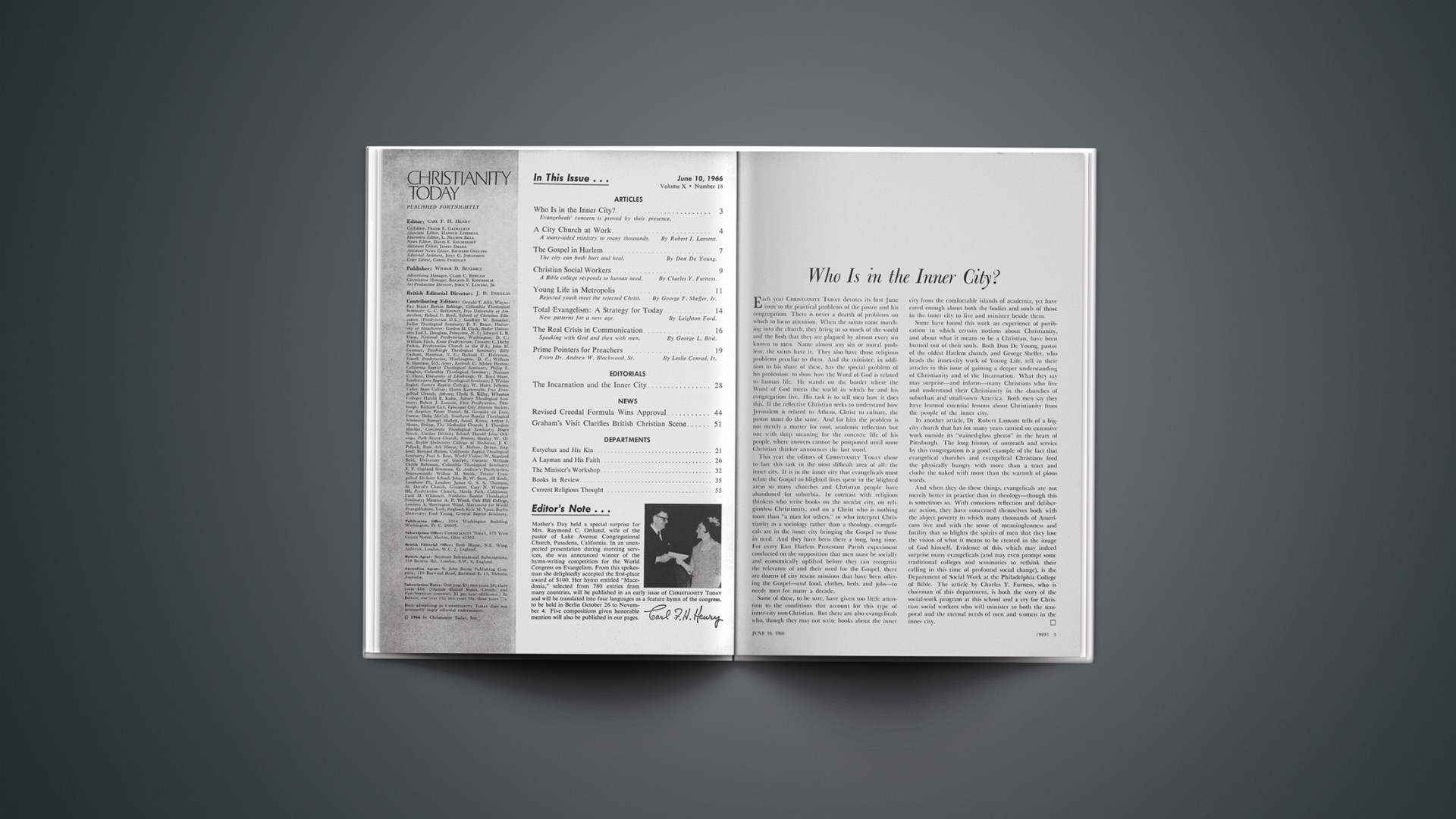Each year CHRISTIANITY TODAY devotes its first June issue to the practical problems of the pastor and his congregation. There is never a dearth of problems on which to focus attention. When the saints come marching into the church, they bring in so much of the world and the flesh that they are plagued by almost every sin known to men. Name almost any sin or moral problem; the saints have it. They also have those religious problems peculiar to them. And the minister, in addition to his share of these, has the special problem of his profession; to show how the Word of God is related to human life. He stands on the border where the Word of God meets the world in which he and his congregation live. His task is to tell men how it does this. If the reflective Christian seeks to understand how Jerusalem is related to Athens, Christ to culture, the pastor must do the same. And for him the problem is not merely a matter for cool, academic reflection but one with deep meaning for the concrete life of his people, where answers cannot be postponed until some Christian thinker announces the last word.
This year the editors of CHRISTIANITY TODAY chose to face this task in the most difficult area of all; the inner city, it is in the inner city that evangelicals must relate the Gospel to blighted lives spent in the blighted areas so many churches and Christian people have abandoned for suburbia. In contrast with religious thinkers who write books on the secular city, on religionless Christianity, and on a Christ who is nothing more than “a man for others,” or who interpret Christianity as a sociology rather than a theology, evangelicals are in the inner city bringing the Gospel to those in need. And they have been there a long, long time. For every East Harlem Protestant Parish experiment conducted on the supposition that men must be socially and economically uplifted before they can recognize the relevance of and their need for the Gospel, there are dozens of city rescue missions that have been offering the Gospel—and food, clothes, beds, and jobs—to needy men for many a decade.
Some of these, to be sure, have given too little attention to the conditions that account for this type of inner-city non-Christian. But there are also evangelicals who, though they may not write books about the inner city from the comfortable islands of academia, yet have cared enough about both the bodies and souls of those in the inner city to live and minister beside them.
Some have found this work an experience of purification in which certain notions about Christianity, and about what it means to be a Christian, have been burned out of their souls. Both Don De Young, pastor of the oldest Harlem church, and George Sheffer, who heads the inner-city work of Young Life, tell in their articles in this issue of gaining a deeper understanding of Christianity and of the Incarnation. What they say may surprise—and inform—many Christians who live and understand their Christianity in the churches of suburban and small-town America. Both men say they have learned essential lessons about Christianity from the people of the inner city.
In another article, Dr. Robert Lamont tells of a big-city church that has for many years carried on extensive work outside its “stained-glass ghetto” in the heart of Pittsburgh. The long history of outreach and service by this congregation is a good example of the fact that evangelical churches and evangelical Christians feed the physically hungry with more than a tract and clothe the naked with more than the warmth of pious words.
And when they do these things, evangelicals are not merely better in practice than in theology—though this is sometimes so. With conscious reflection and deliberate action, they have concerned themselves both with the abject poverty in which many thousands of Americans live and with the sense of meaninglessness and futility that so blights the spirits of men that they lose the vision of what it means to be created in the image of God himself. Evidence of this, which may indeed surprise many evangelicals (and may even prompt some traditional colleges and seminaries to rethink their calling in this time of profound social change), is the Department of Social Work at the Philadelphia College of Bible. The article by Charles Y. Furness, who is chairman of this department, is both the story of the social-work program at this school and a cry for Christian social workers who will minister to both the temporal and the eternal needs of men and women in the inner city.










